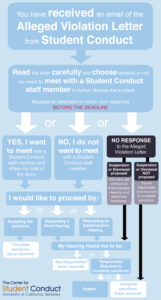
Behavioral and Academic Misconduct Case Flowchart
Behavioral and Academic Misconduct Case Flowchart
You have received an email of the Alleged Violation Letter from Student Conduct. Read the letter carefully and choose whether or not you want to meet with a Student Conduct staff member to further discuss the incident. You may also request an extension or return your response BEFORE THE DEADLINE.
- Learn more about an informal resolution meeting from our Informal Resolution Meeting Tip Sheet.
- Review the Academic Misconduct Resource Sheet for Students
Conduct Process Overview
Option 1
- YES, I want to meet with a Student Conduct staff member and share my side of the story. Or
- No, I do not want to meet with a Student Conduct staff member.
I would like to proceed by:
- Accepting the sanctions/ resolution plan.
- Complete sanctions. Case resolved.
- Requesting a Panel Hearing.
- My hearing found me to be:
- “Not Responsible.” Case resolved.
- “Responsible.” Required to complete sanctions and resolution plan.
- Appeal, or
- Complete sanctions. Case resolved
- My hearing found me to be:
- Requesting an Administrative Hearing.
- My hearing found me to be:
- “Not Responsible”. Issue resolved.
- “Responsible”. Required to Complete sanctions.
- Appeal, or
- Complete sanctions. Issue resolved
- My hearing found me to be:
Option 2
NO RESPONSE to the Alleged Violation Letter.
- If Suspension or Dismissal is proposed, the IHO will conduct an Administrative Hearing and determine sanctions. My hearing found me to be:
- “Not Responsible”. Issue resolved.
- “Responsible”. Required to Complete sanctions.
- Appeal, or
- Complete sanctions. Issue resolved.
- Suspension or Dismissal proposed. Found responsible and required to complete sanctions/resolution plan.
- Complete sanctions. Case resolved.
See policies specific to sexual misconduct cases.
The conduct process is used to determine if a student or student organization engaged in behavior that violates the Code of Student Conduct. Additional details are available in the Code of Student Conduct, including exceptions to this process.
Complaint Received
When Student Conduct receives information that indicates that a student may have engaged in behavior that appears to violate the Code of Student Conduct, we inform the student of this and ask the student to schedule a meeting to discuss the incident.
Informal Resolution
An informal resolution is reached in the initial meeting with a conduct staff and the student. The case is resolved if the student accepts the resolution and agrees to complete sanctions. Student Conduct may make other decisions at this time, such as determining that more investigation is needed, to issue a notification or to drop the case.
Formal Resolution – Hearing
If the student does not want to accept the sanctions or prefers to have a hearing, of if Student Conduct believes it is appropriate, the case will be forwarded to a hearing. Prior to the hearing, the student will be asked to submit any information for the hearing body to review. The student will also receive a copy of the hearing packet to review prior to the hearing. For more detailed information about hearings, see Hearing Information.
Dean’s Decision – Sanctions
After the hearing, the decision letter is issued by the Dean of Students. Although the Dean must uphold the finding of responsibility, they may adjust the sanctions that the hearing panel recommends. Sanctions aim to help a student reflect on their actions, to learn how to act in ways that are congruent with the community expectations, to repair any harm caused, and sometimes to remove the student from campus if warranted.
Appeals
Appeals may be made in writing to the Vice Chancellor for Student Affairs and must be based on new information not available at the time of the hearing, significant procedural error, or other good cause.
Resolution
Student Conduct strives to resolve cases in a timely fashion. We must balance our need for adequate time to investigate alleged violations with the impact those alleged violations have on the campus community and individual students involved in the process. Students should also note that the campus conduct process is separate from legal proceedings and may occur simultaneously.